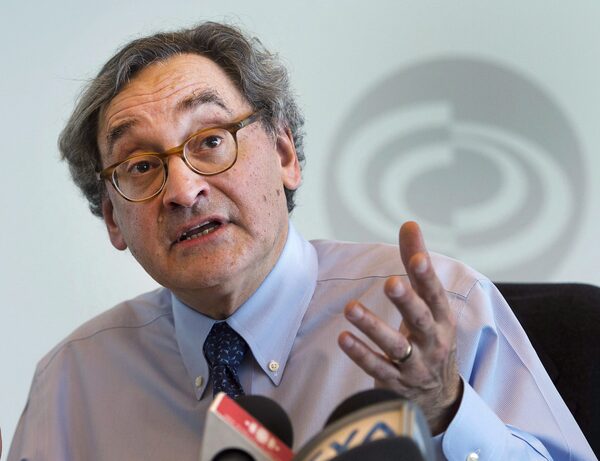
Michael Sabia's departure as chief executive of Quebec's Caisse de dépot comes a year before his current four-year term was to expire in early 2021.Ryan Remiorz/The Canadian Press
Michael Sabia could hardly pick a better moment to step down as head of Caisse de dépot et placement du Québec, having guided the giant provincial pension-fund manager out of the mess it was in when he arrived nearly 11 years ago and leaving before the next recession plunges it back into the dumps.
Yet, this is not how he wanted his tenure to end. His departure a year before his current four-year term was to expire in early 2021 will mean Mr. Sabia will not be around to oversee the completion of the project he has relished most as the Caisse’s chief executive: the $6.3-billion Réseau express métropolitain light-rail transit network that has come to symbolize Montreal’s economic rebirth.
Quebec Premier François Legault, however, has never been a big fan of Mr. Sabia. If Mr. Sabia is leaving early, it is because the Premier has decided he should. Mr. Legault favours a more interventionist Caisse, one that sees its role as a backer of Québécois entrepreneurs and a rampart against foreign takeovers.
“I think Michael would have liked to cut the ribbon on the REM,” said former Caisse executive Michel Nadeau, now executive manager of the Montreal-based Institute for Governance of Private and Public Organizations. “But I think Mr. Legault and [Quebec Finance Minister] Éric Girard decided to cut his mandate short because they have a candidate in mind and the candidate does not want to wait.”
As leader of then-opposition Coalition Avenir Québec in 2016, Mr. Legault was highly critical of the sale of Quebec-based Rona Inc. to U.S.-based Lowe’s Cos. Inc., a transaction only made possible by the Caisse’s decision to tender its 17-per-cent stake in the homegrown home-improvement chain.
“What we want [for Quebec] is an economy of owners, not an economy of branches,” Mr. Legault said at the time. “Do you think the new shareholders, the new managers, who are Americans, are going to use Quebec lawyers and accountants?”
As the Parti Québécois finance critic in 2009, Mr. Legault opposed Mr. Sabia’s nomination, accusing then-premier Jean Charest of interfering in the selection process the Caisse’s board had set up to select a permanent successor to Henri-Paul Rousseau, who had left under a cloud in 2008. As Premier, however, Mr. Legault appears to be preparing to impose his own preference on the Caisse board.
That might not be a problem if the Premier’s preferred candidate is Sophie Brochu, considered a star in Quebec business circles, who recently stepped down as CEO of the province’s main natural-gas distributor Énergir Inc. Ms. Brochu was groomed to take the helm at Énergir’s predecessor company, Gaz Métro Inc., by none other than Robert Tessier, who now chairs the Caisse’s board. Ms. Brochu, who would be the first woman to lead the Caisse, has been rumoured to have an inside track on the job.
Whoever succeeds Mr. Sabia, she or he will be expected by Mr. Legault to take a more visible role in establishing the Caisse as a strategic tool of economic development in the province. While the Caisse has been active under Mr. Sabia in promoting emerging technology companies in Quebec, and went out on a limb in backing a controversial cement factory on the Gaspé Peninsula favoured by politicians, it has not been seen as the champion of a homegrown business class that it once was.
Mr. Legault, who was an executive at Air Transat during the old-style Caisse’s heydays in the early 1980s, is nostalgic for that era. At the end of 2018, only 14 per cent of the Caisse’s $309-billion in assets under management were invested in private-sector businesses in Quebec.
The Caisse’s recent moves with respect to SNC-Lavalin Group Inc., in which the pension-fund manager holds a 20-per-cent stake, has also left its political overlords questioning Mr. Sabia’s strategy with regards to the troubled engineering giant. While Caisse insiders insist Mr. Sabia has not explicitly endorsed SNC-Lavalin’s decision to stop bidding on lump-sum turnkey infrastructure projects, the pension-fund manager has appeared to back moves by SNC-Lavalin’s management to reduce the company’s risk profile. That could imply shrinking the company substantially.
Still, despite the less than ideal circumstances of his departure, Mr. Sabia can leave the Caisse with a sense of mission accomplished. He showed serious guts in taking the job in 2009, overcoming opposition led by nationalist politicians and commentators upset that an anglophone who had overseen a shift in BCE Inc.’s de facto head office operations to Toronto from Montreal had been chosen to take the reins at an institution created in the 1960s in part to enable francophone Quebeckers to wrest control of their economy from an English-speaking elite.
Mr. Sabia’s detractors were gunning for him to fail. Not only did he disappoint them, he took the Caisse to new heights unimaginable in 2009. And he leaves the Caisse in arguably the best shape it has ever been in. That has to feel good.
 Konrad Yakabuski
Konrad Yakabuski